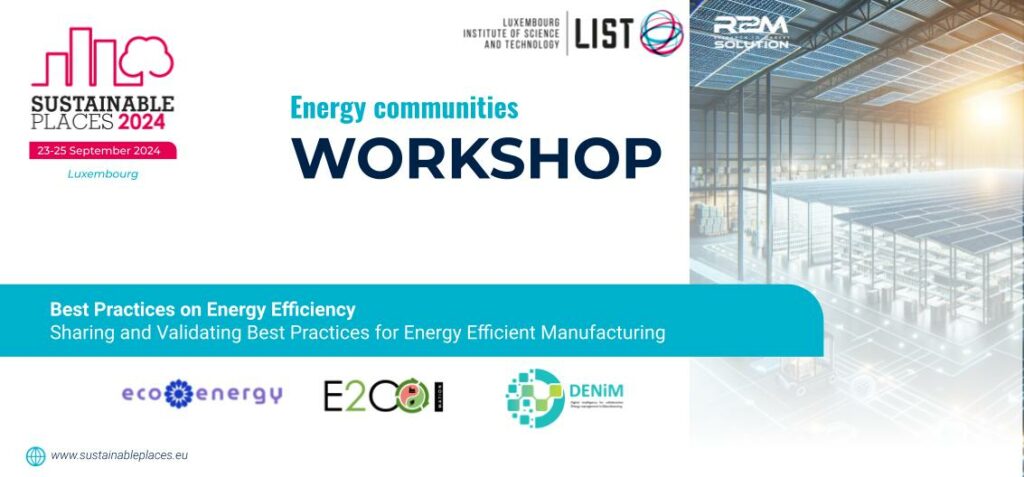Best Practices for Energy Efficient Manufacturing
Wednesday 25 September 2024 | 14:00-15:30 | Briefing Room DE | Workshop | Hybrid

Sharing and Validating Best Practices for Energy Efficient Manufacturing
Manufacturing systems are complex as many parameters, related to environment, components, usage of materials, machines, cells, lines, and supply chains, collectively influence the energy performance of production processes. Different technologies and approaches of managing energy efficiency in manufacturing have already been studied in the past. However, the challenge is now to combine all these technologies in a holistic, intelligent, and interoperable approach to ensure a comprehensive implementation, providing significant energy savings. To answer this specific challenge and to improve industrial energy efficiency, the DENIM and E2COMATION projects were funded by Horizon 2020 under the call DT-FOF-09-2020 – Energy-efficient manufacturing system management (IA). These projects collectively develop energy-efficient best practices to overcome the barriers limiting the application of sustainable practices in manufacturing sectors. This is largely driven by the ability to acquire, process, and distil massive amounts of data across existing silos in a manufacturing plant. It requires innovative approaches to integrate energy and performance data, such as historical data, real-time data, and real-time predicted energy and costs into the production management and decision support systems. Leveraging key enabling digital technologies (such as digital twin, machine learning, big data analytics), these projects have achieved more sustainable, resource- and energy-efficient manufacturing processes, resulting in more innovative products, processes, and services.
DENiM has developed a Digital Intelligence Platform to enable a collaborative approach to industrial energy management. This constitutes an integrated toolchain to provision advanced digital services including secure edge connectivity leveraging IoT, data analytics, digital twin, energy modelling, and automation culminating in the delivery of continuous energy impact assessment, together with energy control and optimisation across existing production facilities, processes, and machines. E2COMATION addresses the optimization of energy usage at multiple hierarchical layers of a manufacturing process as well as considering the whole life-cycle perspective across the value chain. E2COMATION provides a cross-sectorial methodological framework and a modular technological platform to help industrial companies save energy and directly be more sustainable from the environmental and economic point of view. This joint workshop will focus on collating and sharing best practices that have been defined during the research projects with specific emphasis on their practical application, successes, and lessons learned at project pilot sites. The outcome of this workshop will be a repository of best practices for energy efficiency management in manufacturing. This will be an interactive workshop to validate the proposed best practices and provide a spotlight on the innovative technologies available to industry.
Contributing projects:
Contributing speakers:
Alan McGibney, Munster Technological University – Susan Rea, Munster Technological University – Andrea Ballarino, Italian National Research Council – Marco Rocchetti, R2M Solution Italy – Marco Pirotta, University of Applied Sciences and Arts of Southern Switzerland – Veronica Dosi and Claudio Capuzzimati, SUPSI : University of Applied Sciences and Arts of Southern Switzerland
Workshop Chair: Alan McGibney, Munster Technological University
